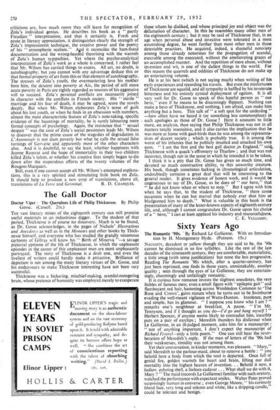The Gall Doctor
Doctor Viper : The Querulous Life of Philip Thicknesse. By Philip Gosse. (Cassell. 21s.) THE vast literary mines of the eighteenth century can still promise useful materials to an industrious digger. To the student of that period, Thicknesse is of course no discovery. Much is to be found, as Dr. Gosse acknowledges, in the pages of Nichols' Illustrations and Anecdotes as well as in the Memoirs and other books by Thick- nesse himself, and everyone who has studied the grandly venomous cartoons of Gillray will know his "Birth of Minerva "—a savage pictorial epitome of the life of Thicknesse, in which the unpleasant episodes in the career of this unpleasant man are most unpleasantly portrayed. The story of Thicknesse is a drab one, and even the liveliest of writers could hardly make it attractive. Brilliance of depiction is not among the many literary virtues of Dr. Gosse, and his endeavours to make Thicknesse interesting have not been very successful.
Thicknesse was a bickering, mischief-making, scandal-mongering brute, whose pretence of humanity was employed merely to exasperate those whom he disliked, and whose principal joy and object was the defamation of character. In this he resembles many other men of the eighteenth century but it may be said of Thicknesse that, in an age when personal abuse and invective were tolerated in a most astonishing degree, he went further than most other men in those detestable practices. He acquired, indeed, a shameful notoriety amOng those already notorious for the propagation of scandal, execrable among the execrated, without the ameliorating graces of an accomplished manner. And the repetition of mere abuse, without invention and wit, is one of the dullest things in the world. For this reason the quarrels and oddities of Thicknesse do not make up an entertaining volume.
He is at his best (which is not saying much) when writing of his early experiences and recording his travels. But even the misfortunes of Thicknesse are squalid, and all sympathy is baffled by his inveterate bitterness and his entirely cynical deployment of egoism. It is all very well for Dr. Gosse to speak of this hateful person as " our hero," even if he means to be disarmingly flippant. Nothing can make a hero of Thicknesse, and nothing, I am afraid, can make him anything but a bore. This talk of" a soft spot for the underdog" —how often have we heard it (or something less commonplace) in such apologies as those of Dr. Gosse ! Here it amounts to little more, on analysis, than saying that Philip Thicknesse was not in all matters totally insensitive, and it also carries the implication that he was more at home with gaol-birds than he was among the representa- tives of decent society; -which is probably true. It is among the worst of his infamies that he publicly insulted and attacked his own sons. "1 am the first and the best gall doctor.in England, saick Thicknesse with a quack's effrontery to Thurlow ; and that was not incorrect, though not in the sense in which he intended it to be taken.
I think it is a pity that Dr. Gosse has given so much time, and devoted so much constructive ability, to this unworthy creature. His book, though sometimes 4acking in Chronological articulation, undoubtedly contains a great deal that will be interesting to the general reader. It gives evidence of honest work, and it would be ungenerous to say of Dr. Gosse, as he does of" our hero," that "he did not know when or where to stop." But I agree with him when he says that, to the student of Thicknesse, " there come occasions when he can but marvel that nobody ever shot him or bludgeoned him to death." What is valuable in this book is the presentation of many of the lesser-known aspects of eightenth-century life, and, although I cannot congratulate Dr. Gosse upon his choice of a" hero," I can at least applaud his industry and resourcefulness.
C. E. VULLIAMY.


































 Previous page
Previous page